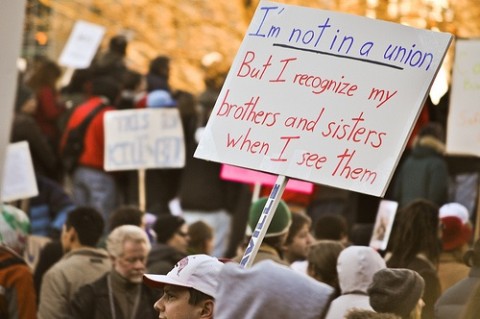Wisconsin's fight over unions' right to exist

I'm a Wisconsin native, and my circles there include a lot of political diversity--and quite a few schoolteachers. So my Facebook wall has been lively ever since the state budget protests began last week. I've been particularly agitated, however, since I woke up yesterday to the sound of a radio reporter observing that Wisconsinites want Gov. Scott Walker and the public-employee unions to reach a compromise.
Reach a compromise? The unions have been all but screaming that they'd love to reach a compromise, but the governor's not budging. Some facts about the situation in Wisconsin:
- While it's true that state workers pay a lower share of their health premiums than most private-sector employees, it's also true that they've made wage sacrifices already in the form of, among other things, furlough days.
- The governor claims his budget bill eliminates only the state workers' right to collectively bargain for benefits, not the right to bargain for base pay. But the bill also prevents their wages from rising faster than inflation--that is, from rising at all in terms of real value. (Allowing workers to bargain while making it impossible for them to get anywhere is like allowing citizens to vote when there's only one candidate.)
- State workers already make far less than their private-sector counterparts--even if you crunch the numbers using both wages and benefits together.
- It's hard to take Gov. Walker's tough budget talk seriously when just weeks ago he pushed tax cuts through that, while not affecting the current fiscal year, will exacerbate shortfalls in the next two years. Assuming Walker keeps his campaign promises--and he's shown no sign of backing off--there are more tax cuts to come.
- The Koch brothers, big-time funders of the allegedly grassroots Tea Party movement, were Walker's second-largest campaign contributor.
- If Walker succeeds in gutting collective bargaining, the city of Madison could lose $7 million in federal transit money--one-sixth of its transit budget. Low-income residents would bear the brunt of the resulting service cuts.
Most importantly, the unions have made it clear that they're willing to take the proposed hit to their members' benefits. What they're not willing to do is give up the right to negotiate in the future--the right to be a functioning union. Walker, however, isn't interested in compromise.
That's because the fight Walker picked with state workers isn't about balancing the budget, and it isn't about making public employees pay a bigger chunk of their benefits. It's about destroying unions.
It's hard to defend everything unions say and do, not least because they spend a fair amount of time arguing amongst themselves. But it's one thing to disagree with how the right to collectively bargain is exercised. It's quite another to attack that right.
Unions built the American middle class, which could use some rebuilding. Organized labor is the last institutional line of defense against corporate interests in politics. Labor rights are recognized by the Universal Declaration of Human Rights, to say nothing of numerous church bodies. The Wisconsin Catholic Conference, for one, has been strongly supportive of state workers' position. (No word as to whether brothers Scott and Jeff Fitzgerald--who lead the senate and assembly Republicans, respectively--will be denied communion for promoting an effort so flatly opposed to church teaching.)
As for Wisconsin's Democratic state senators, they're hiding out in Illinois to avoid a quorum call--but the Republicans have some tricks of their own in mind. And farther away, other governors are looking to follow Walker's lead.




